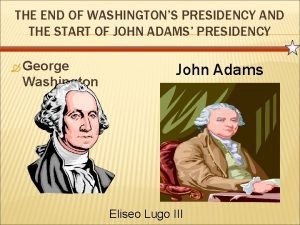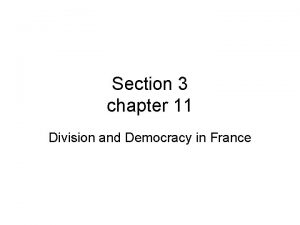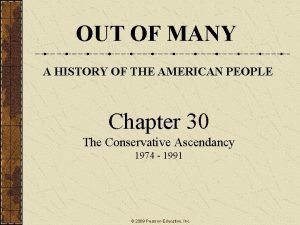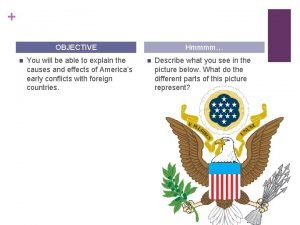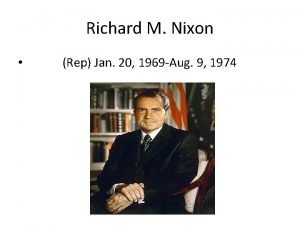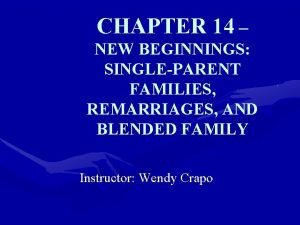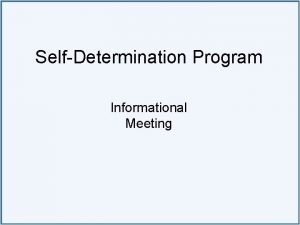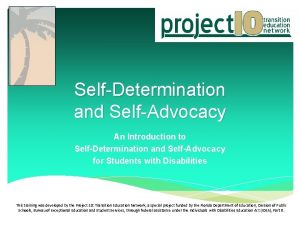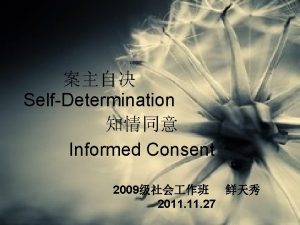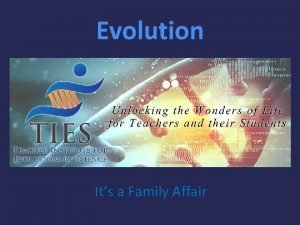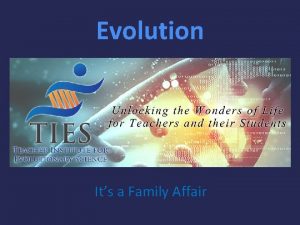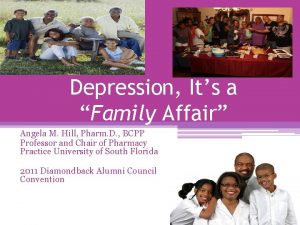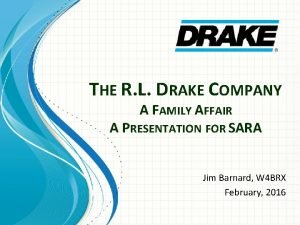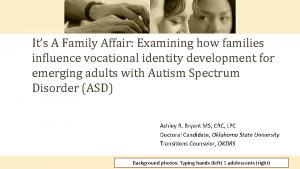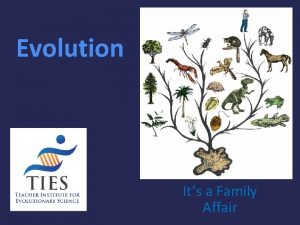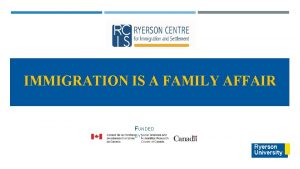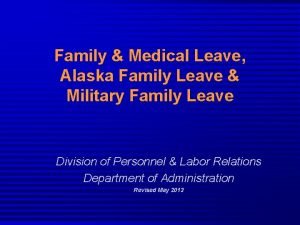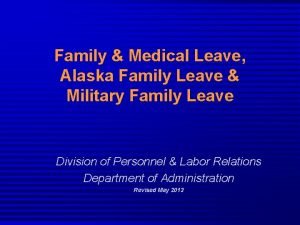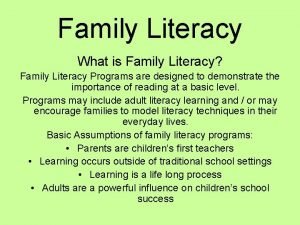SelfDetermination A Family Affair Michael L Wehmeyer Ph































- Slides: 31

Self-Determination: A Family Affair Michael L. Wehmeyer, Ph. D. Ross and Marianna Beach Distinguished Professor in Special Education Chair, Department of Special Education Senior Scientist and Director, Beach Center on Disability University of Kansas

Article 3 -General Principles, United Nations Convention on the Rights of Persons with Disabilities a. Respect for inherent dignity, individual autonomy including the freedom to make one’s own choices, and independence of persons; adjective • existing in someone or something as a inherent [in-heer-uh-nt] permanent and inseparable element, quality, or attribute. dignity [dig-ni-tee] • The state of being worthy or honorable, Synonyms innate, native, inbred, ingrained elevation of mind or character, true worth; • Elevated rank; honorable station; high office; • Quality suited to inspire respect or reverence; loftiness and grace, impressiveness; stateliness. Inherent Dignity From dignus [Latin] meaning worthy

Historic Understandings of Disability Historically, disability was understood within a model that was an extension of the medical model, which viewed health problems as an individual pathology; a problem within the person. Within such a context, disability was understood as a characteristic of the person; as residing with the person. The person was seen as broken, diseased, pathological, atypical, or aberrant; as outside the norm. Perhaps unavoidably, people with disabilities were, consequently, associated with numerous negative stereotypes. The advent of intelligence testing, particularly with the introduction of ‘Mental Age’ estimates, led to “infantilization” of people with disability.

The Parent Movement 1950 to 1990 Earlier stereotypes of disability were replaced with more humane, though still in many ways debilitating, stereotypes. People with disabilities were seen as objects to be fixed, cured, rehabilitated and, at the same time pitied; as “victims” of their disabling condition, worthy of charity. Holy innocents; eternal children Increased emphasis on the community as where people belonged. Fundamentally, though, how disability was understood (e. g. , as a problem residing within the person) did not change.

Historic Understandings of Disability 1. Understanding people as different soon becomes construed as inferior, leading to discrimination and maltreatment. 2. Separate is never equal. 3. We are constrained by our own lack of imagination. 4. We have always been wrong about what we believe people with disability can achieve. 5. The injustice committed against people with disability throughout time has been to deny them the dignity afforded to persons simply by their status as human beings.

The Emergence of Strengths-Based Models of Disability 1980 - International Classification of Impairments, Disabilities, and Handicaps (ICIDH) 2001 - International Classification of Functioning, Disability and Health (ICF)

Changing Understandings of Disability Personal Incompetence

Changing Understandings of Disability Environment Personal Competence

Changing Understandings of Disability y t i l i b a s i D Environment Personal Competence

Implications of Changing Understandings of Disability Ø Strengths-based Ø Part of, and not apart from, typical human functioning Ø Focus on environment/context, not fixing the person; Ø Emphasizes supports, not programs Ø Emphasis on promoting/supporting self-determination.

VIA Classification of Strengths © Copyright 2011 -2015 VIA INSTITUTE ON CHARACTER. ALL RIGHTS RESERVED.

Supports are resources and strategies that… • • • promote the interests and causes of individuals with or without disabilities; enable them to access opportunities, information, and relationships inherent within integrated work and living environments; result in enhanced interdependence, productivity, community inclusion, life satisfaction, and human functioning. In other words, anything that enable a person to live a selfdetermined life. Specialized Services Generic Services Nonpaid Supports Family & Friends Person

Dignity, Respect, Equality… "People with autism should be treated with the same dignity, respect, and equality as people without autism. ” Jean-Paul Bovee "We don't have to be told what selfdetermination means. We know it is just another word for a life filled with rising expectations, dignity, respect and opportunities. “ Robert Williams

The Right to Self. Determination Bengt Nirje (1972) One major facet of the normalization principle is to create conditions through which a disabled person experiences the normal respect to which any human being is entitled. Thus, the choices, wishes, desired, and aspirations of a disabled person have to be taken into consideration as much as possible in actions affecting him. To assert oneself with one’s family, friends, neighbors, co-workers, other people, or vis-à-vis an agency is difficult for many persons. It is especially difficult for someone who has a disability or is otherwise perceived as devalued. But, in the end, even the impaired person has to manage as a distinct individual, and thus has his identity defined to himself, and to others, through the circumstances and conditions of his existence. Thus, the road to selfdetermination is indeed both difficult and allimportant for a person who is impaired.

The Right to Self-Determination Bengt Nirje (1972) clearly articulates the importance of this personal self-determination to all people, not excluding people with intellectual and developmental disabilities; equates self-determination with the respect and dignity to which all people are entitled; recognized that people define themselves, and others define them, by the circumstances and conditions of their lives. This recognition that self-determination is fundamental to attaining respect and dignity and to perceiving oneself as worthy and valued is a major reason people with disabilities have been unequivocal and consistent in their demand for control in their lives.

The Dignity of Risk Robert Perske(1972) The world in which we live is not always safe, secure and predictable. . We must work to develop every human resource within us in order to prepare for these days. To deny any person their fair share of risk experiences is to further limit them for healthy living. (p. 199)

Determination of one's own fate or course of action without compulsion; selfdetermination: noun (sèlf´dî-tûr´me -nâ´shen) Freedom of the people of a given area to determine their own political status; independence. self-determined, adj. -- self-determining, adj. The American Heritage Dictionary of the English Language, Third Edition (1992). Houghton Mifflin Company.

Self-Determination and Disability Within the context of the disability rights and advocacy movement, the construct as a personal characteristic has been imbued with the empowerment and “rights” orientation typically associated with the sense of the term as a national or political construct. Empowerment is a term usually associated with social movements, and the struggle of marginalized people for equal rights.

Self-Determination and Determinism The philosophical doctrine of determinism posits that actions are caused by events or natural laws that precede or are antecedent to the occurrence of the action. Behavior, then, is governed by these other events or natural laws.

Self-Determination and Determinism Self-determinism, or selfdetermination, implies that individuals cause themselves to act in certain ways, as opposed to someone or something else ‘causing’ us to act in certain ways People who are self-determined embody the characteristic or quality of ‘self-determination, ’ a noun referring to the degree to which that person acts or behaves in ways that are self(instead of other-) caused.

What is Self. Determination? Ø Self-determined behavior refers to volitional actions that enable one to act as the primary causal agent in one’s life and to maintain or improve one’s quality of life. Ø Causal agency: To make or cause something to happen in one’s life. Ø Volitional action: Making a conscious choice or decision with deliberate intention.

Why is Self. Determination Important? “When I moved to New Bedford, I wanted to open a checking account. I went over to the bank and gave the $10 to open the account and asked them if there would be a problem. They said no. But, when I went back a couple of days later, they said they couldn’t understand my signature. ”

Why is Self. Determination Important? “I thought about this and realized that I had a checking account before I moved, and that had worked fine. The next morning, I put on a suit and tie and went down to the main branch. I asked to see the bank president. They told me he was in a meeting. I told them I would wait. ”

Why is Self. Determination Important? “I waited for about 2 minutes and he came out. He brought me into a room and asked me what the problem was. I told him. I also brought my canceled checks and showed him that I had an account before. He apologized and I got my checking account. That is why self-determination is important to me. ” Raymond Gagne

Pearl S. Buck, 1932 Pulitzer Prize, 1938 Nobel Prize "none who have always been free can understand the terrible fascinating power of the hope of freedom to those who are not free. "

Promoting Self. Determination Ø Choice-making Ø Decision-making Ø Problem-solving Ø Goal setting and attainment Ø Self-advocacy Ø Self-management and self-regulation Ø Autonomous motivation Ø Self-awareness Ø Self-knowledge

Self. Determination: The Importance of Family

Self-Determination: The Importance of Family Walk • Walk the tightrope between protection and independence. Allow your son or daughter to explore his or her world. Encourage • Encourage your child to ask questions and express opinions. Involvement in family discussions and decision-making sessions is one way of providing this opportunity to learn. Recognize • Recognize the process of reaching goals, don’t just emphasize outcomes.

Self-Determination: The Importance of Family • Schedule opportunities for interactions with children of different ages and backgrounds. • Don’t leave choice-making opportunities to chance. Take every opportunity to allow your child to make choices; what she wears, what is served for dinner, or where the family goes for vacation. • Have high expectations for your child and don’t be afraid to hope! Schedule Don’t leave Have

Positive Approaches Ø Self-Determination Ø Mindfulness Ø Positive-Behavior Supports Ø Quality of Life Ø Friendships Ø Well-Being Ø Character Strengths Ø Technology Supports Ø High Expectations

http: //wehmeyer. pbworks. com/ http: //www. ngsd. org
 Michael j. burt “we are family”
Michael j. burt “we are family” Boulanger affair
Boulanger affair Mann-elkins act 1910 apush definition
Mann-elkins act 1910 apush definition Marriage is a private affair by chinua achebe
Marriage is a private affair by chinua achebe Alien and sedition acts summary
Alien and sedition acts summary Whats the xyz affair
Whats the xyz affair Oliver north iran contra affair
Oliver north iran contra affair Ryutin affair
Ryutin affair Information & computing are amoral
Information & computing are amoral Characters of marriage is a private affair
Characters of marriage is a private affair The xyz affair dilemma
The xyz affair dilemma Whats jays treaty
Whats jays treaty Chapter 11 section 3 division and democracy in france
Chapter 11 section 3 division and democracy in france Xyz affair
Xyz affair Xyz affair quote
Xyz affair quote Poque affair
Poque affair Wondrous is the affair of the believer
Wondrous is the affair of the believer Oliver north iran contra affair
Oliver north iran contra affair Xyz affair comic strip
Xyz affair comic strip Xyz affair
Xyz affair Xyz affair cartoon
Xyz affair cartoon Poque affair
Poque affair Iran contra affair
Iran contra affair Conclusion on topic family
Conclusion on topic family Varies from family to family on the periodic table
Varies from family to family on the periodic table Blended family vs binuclear
Blended family vs binuclear Michael taylor inglaterra
Michael taylor inglaterra Michael bostelmann
Michael bostelmann Michael j cima
Michael j cima Michael canale linguist
Michael canale linguist Michael alley penn state
Michael alley penn state Harry hess and seafloor spreading
Harry hess and seafloor spreading











